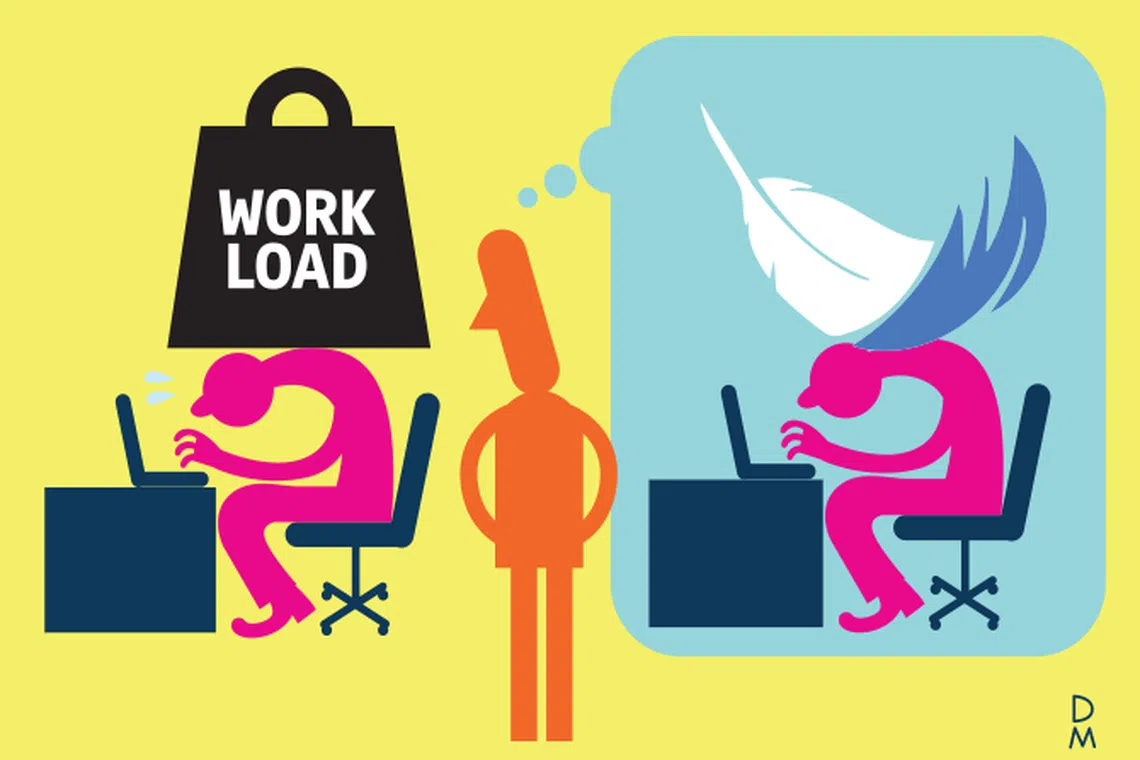askST Jobs: What can I do when co-workers underestimate my effort?
Sign up now: Get ST's newsletters delivered to your inbox

Experts suggest that the onus is on supervisors to mindfully observe and recognise the effort workers put in.
ST ILLUSTRATION: MIEL
In this series, manpower reporter Tay Hong Yi offers practical answers to candid questions on navigating workplace challenges and getting ahead in your career. Get more tips by signing up to The Straits Times’ HeadSTart newsletter
Q: My colleagues seem to think I’m not doing much even though I feel I have been working hard. What should I do?
A: People often overestimate their own effort and ability, says Assistant Professor Jared Nai of Singapore Management University.
“Unless others have full visibility and monitoring of your work, chances are that they will not be able to observe and register all the effort that you have put into your work,” adds Prof Nai, who is an organisational behaviour and human resources researcher.
This means others may use results as an imperfect indicator of how much effort a worker has put in, even when effort does not always clearly translate into outcomes, Prof Nai notes.
Moreover, workers may attribute a colleague’s successes to external factors, such as luck, that cannot be replicated, he says.
They may also chalk up a colleague’s poor performance, even that resulting from external factors such as economic downturn, to an intrinsic lack of effort.
“This is a form of self-preservation due to high social comparison concerns at the workplace.
“No one wants to feel that they are poor performers. Therefore, they often attribute others being successful to be due to external factors, and that they would not be able to achieve equivalent success even if they were to put in more effort,” Prof Nai says.
Similarly, says Dr Victor Seah, director of the Behavioural Insights Centre of Excellence at the Singapore University of Social Sciences, individuals may sometimes be motivated to see themselves as superior to the colleague.
Aside from these motivations, workers may also underestimate the amount of effort put in by a colleague as they do not have all the information or use different measures of work done, such as quantity of output rather than time spent, Dr Seah notes.
Prof Nai says that using results as an indicator may not be possible for many jobs where the outcomes are not as easily visible or directly attributable to individual employees, such as in human resources.
Effort is also more difficult to observe in workplaces with more complex tasks or those that do not require as much collaboration on the same task, Prof Nai says.
Prof Nai suggests that the onus is on supervisors to mindfully observe and recognise the effort workers put in, diagnose why this effort does not lead to the desired outcomes, and help to redirect workers’ efforts to obtain higher efficiency.
“If it is an ability issue, then employees need to be sent for training to correct their skill deficit.”
For their part, workers can help alleviate this mismatch in perceived effort by managing the impression they give to others.
This includes being visible, such as by sharing achievements and progress with colleagues, says Prof Nai.
Workers can also invite colleagues to collaborate and share in joint successes or achievements.
Dr Seah, an organisational psychologist, advises workers to consider what the visible signals of effort that their colleagues can rely on are, and how such signals would be interpreted.
They should also proactively share the process and context of their work.
Prof Nai also advises workers to understand what outcomes are valued and work towards these outcomes.
“Ask others for help if effort is not translating into outcomes.”
Dr Seah says: “Employers can also better recognise people for their effort by expanding their definition of impact.”
For instance, a salesperson who, despite working hard, does not close a deal may have built stronger relations, which can form part of an expanded definition of impact, he says.


